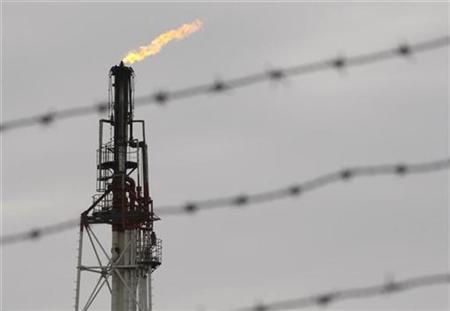Date: 17-Nov-09
Country: JAPAN
Author: Risa Maeda

Japan Greenhouse Emissions Fell 6.2% Last Year Photo:
Issei Kato
A gas flare is seen through a barbed-wire fence at an oil factory in
Kawasaki, south of Tokyo October 20, 2009.
Photo: Issei Kato
TOKYO - Japan's greenhouse gas pollution fell 6.2 percent in the last
financial year, the government said on Wednesday, confirming market
views that the worst recession in decades largely contributed to
emission cuts.
Emissions in the first year of Japan's Kyoto Protocol obligations
totaled 1.286 billion tonnes of CO2-equivalent, compared with a revised
1.371 billion tonnes in the previous year ended in March 2008, a record
high.
The 2008/09 figure is approaching the Kyoto goal for the world's fifth
biggest emitter of 1.186 billion tonnes a year.
The government and companies have bought hundreds of millions of tonnes
of emissions offsets, helping the country meet its 2008-12 Kyoto target
in deals worth billions of dollars at current prices.
"The figure suggests we're currently at levels sufficiently (low) enough
to achieve the target," said Yasuo Takahashi, who heads the environment
ministry's climate change policy division.
"But we're not saying that we no longer need to carry out the
emission-cut plans," he said at a news conference after the data was
released. "2008/2009 was an unusual year."
With deflation expected in coming years, there seems little risk of
Japan not meeting its Kyoto goals.
The Bank of Japan said in a report last month that Japan will experience
three years of deflation, forecasting the economy to contract another
3.2 percent in fiscal 2009/2010 before recovering in the following two
years.
MID-TERM HURDLE
Analysts forecast a further fall in emissions in 2009/2010 as the steel
sector, which accounts for 10 percent of total greenhouse gas emissions
in Japan, would be among the hardest hit by recession.
"Another 5 to 6 percent fall in CO2 emissions from burning fuel is quite
possible this fiscal year given an expected fall year-on-year in crude
steel output," said Tsutomu Toichi, chief executive researcher at the
Institute of Energy Economics of Japan.
In 2008/2009, carbon emissions from energy consumption, which accounted
for 88 percent of Japan's total greenhouse gas emissions, fell 6.7
percent to 1.14 billion tonnes.
It was the steepest fall on record as the world's No.2 economy shrank
3.2 percent.
But analysts said the news, while good, could make it harder for Japan
to meet ambitious cuts beyond 2012 when Kyoto's first period ends unless
the government takes steps now to spell out tougher measures to slash
carbon pollution by 2020.
"The government has not yet decided whether to introduce a carbon tax.
But that sounds like a joke to me," said Mitsuhiro Fukao, president of
Japan Center for Economic Research.
"Imposing a carbon tax to the upper end of energy suppliers is a must,
together with other measures, to get 80 percent of the 2020 target
achieved by domestic efforts," Fukao said, referring to the country's
mid-term target revealed by Prime Minister Yukio Hatoyama at a U.N.
meeting in September.
Hatoyama said Japan would cut greenhouse gas emissions to 946 million
tonnes by 2020, down 25 percent from 1990 levels, on the premise that
there would be an ambitious international climate agreement beyond 2012.
But his government has been struggling to decide major clean energy
policy measures beyond one-off payouts.
WARM WINTER
A warm winter helped reduce emissions from houses and offices and the
transport sector benefited from higher motor vehicle fuel efficiency and
falling land transport cargoes.
Japan is committed under the Kyoto Protocol to cut greenhouse gas
emissions to 1.186 billion tonnes a year over the five years to March
2013, down 6 percent from 1.261 billion tonnes in 1990/1991, Japan's
Kyoto base year.
The goals include 20 million tonnes a year of emissions rights that
Tokyo plans to buy from abroad and spending at home on forest
conservation to absorb an estimated 48 million tonnes of CO2 a year.
Assuming these offsets are in place as planned, the country is allowed
to emit as much as 1.25 billion tonnes.
Moreover, power companies last financial year redeemed 64 million tonnes
of emissions rights in total, giving Japan room to emit more than 1.25
billion tonnes.
In 2008/2009, the recession limited new private spending on energy
efficiency. But the power sector, which has voluntary emissions
reduction targets, has been aggressively buying emissions rights from
abroad given a poor run rate for their nuclear plants.
Their buying reached a total of 250 million tonnes by March.
© Thomson Reuters 2009 All rights reserved
